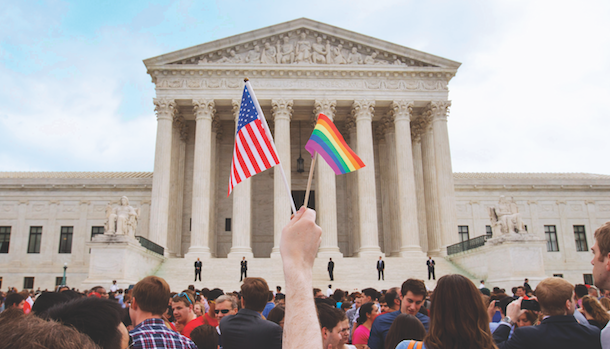Scalia Defends Past Comments Some See As Anti-Gay
by Kevin Liptak, CNN
(CNN)—As the nation’s top court prepares to tackle the contentious issue of same-sex marriage, one of its most conservative justices defended past writings linking bans on homosexual sodomy to bans on sex with animals and murder.
Speaking at Princeton Monday, Associate Justice Antonin Scalia said his previous comments, made in multiple Supreme Court dissents, were effective in making the argument that legislatures should be able to ban behavior deemed immoral.
When a questioner who identified as gay asked whether making such comparisons was necessary, Scalia said “I don’t think it’s necessary but I think it’s effective.”
“If we cannot have moral feelings against homosexuality, can we have it against murder, can we have it against these other things?” Scalia asked, according to an audio recording provided to CNN by someone who attended the event, which was meant to promote Scalia’s new book, Reading Law: The Interpretation of Legal Texts. The website of Princeton’s department of communications said more than 700 people attended the session.
Scalia said his dissents were meant to be “a reduction to the absurd,” not a comparison between homosexual acts and murder.
He did not specifically reference the court’s decision to hear arguments involving the federal Defense of Marriage Act, which denies federal benefits to same-sex couples legally married in their own state. The court is also slated to hear a challenge to California’s Proposition 8, a voter-approved referendum that took away the right of same sex-marriage that previously had been approved by the state’s courts.
In the initial question, Scalia was asked about his dissent of a 2003 Supreme Court ruling tossing out state laws against homosexual sodomy—a decision Scalia said “called into question” state bans against “bigamy, same-sex marriage, adult incest, prostitution, masturbation, adultery, fornication, bestiality, and obscenity.” The case was Lawrence v. Texas.
In the dissent, Scalia—joined by Chief Justice William Rehnquist and Justice Clarence Thomas—said the court “has largely signed on to the so-called homosexual agenda.”
“Many Americans do not want persons who openly engage in homosexual conduct as partners in their business, as scoutmasters for their children, as teachers in their children’s schools, or as boarders in their home,” Scalia wrote. “They view this as protecting themselves and their families from a lifestyle that they believe to be immoral and destructive.”
“Let me be clear that I have nothing against homosexuals, or any other group, promoting their agenda though normal democratic means,” the justice continued. But he wrote the court is “departing from its role in assuring, as neutral observer, that the democratic rules of engagement are observed”—in other words, allowing the legislative branch of the federal government to determine law.
Jeffrey Toobin, CNN’s senior legal analyst, said Tuesday Scalia was raising the question, “Is moral disapproval alone a legitimate basis for a government to act?”
“His position is moral disapproval of homosexuality, of bestiality, of murder is legitimate grounds for government action. The question is whether four other justices agree with him,” Toobin said.
Last week the Supreme Court agreed to hear two constitutional challenges to state and federal laws dealing with the recognition of gay and lesbian couples to legally wed.
In a one-page order on Friday, the court took on what will be one of the most important issues in its history. The decision to review the matter came just weeks after voters approved same-sex marriage in three states. Oral arguments will likely be held in March with a ruling by late June.
There is “absolutely no way” Scalia will recuse himself of the case after making his comments Monday, said Toobin. There are no specific guidelines for Supreme Court justices to step down from a case they have a personal involvement with.
“He’s in this case for better or worse,” Toobin said.
Scalia excused himself in a high-profile 2004 case over whether public school children should be forced to hear the Pledge of Allegiance being recited in the classroom. He had made comments on the topic at a Virginia rally months before the arguments.
CNN’s Bill Mears contributed to this report.










